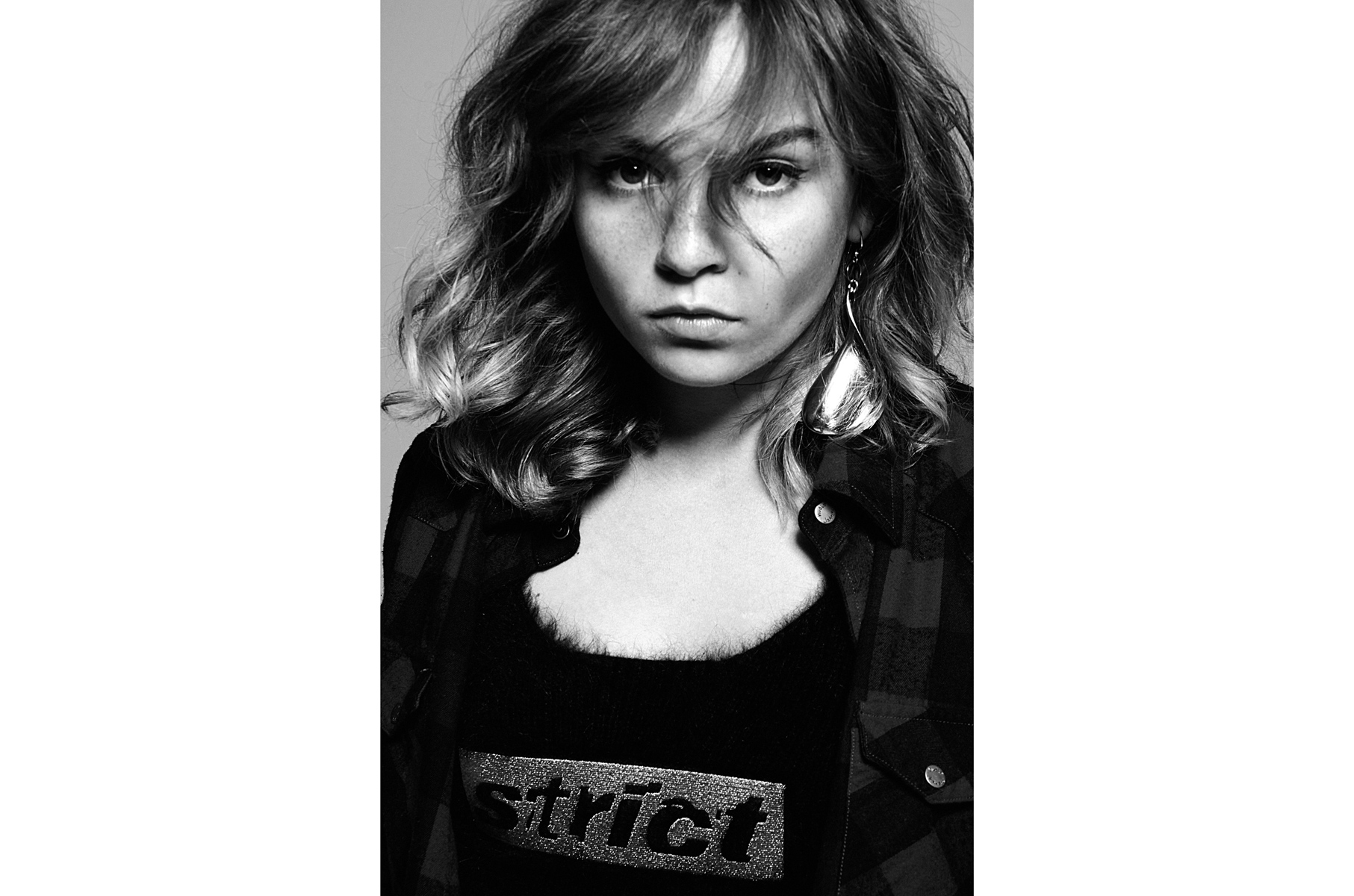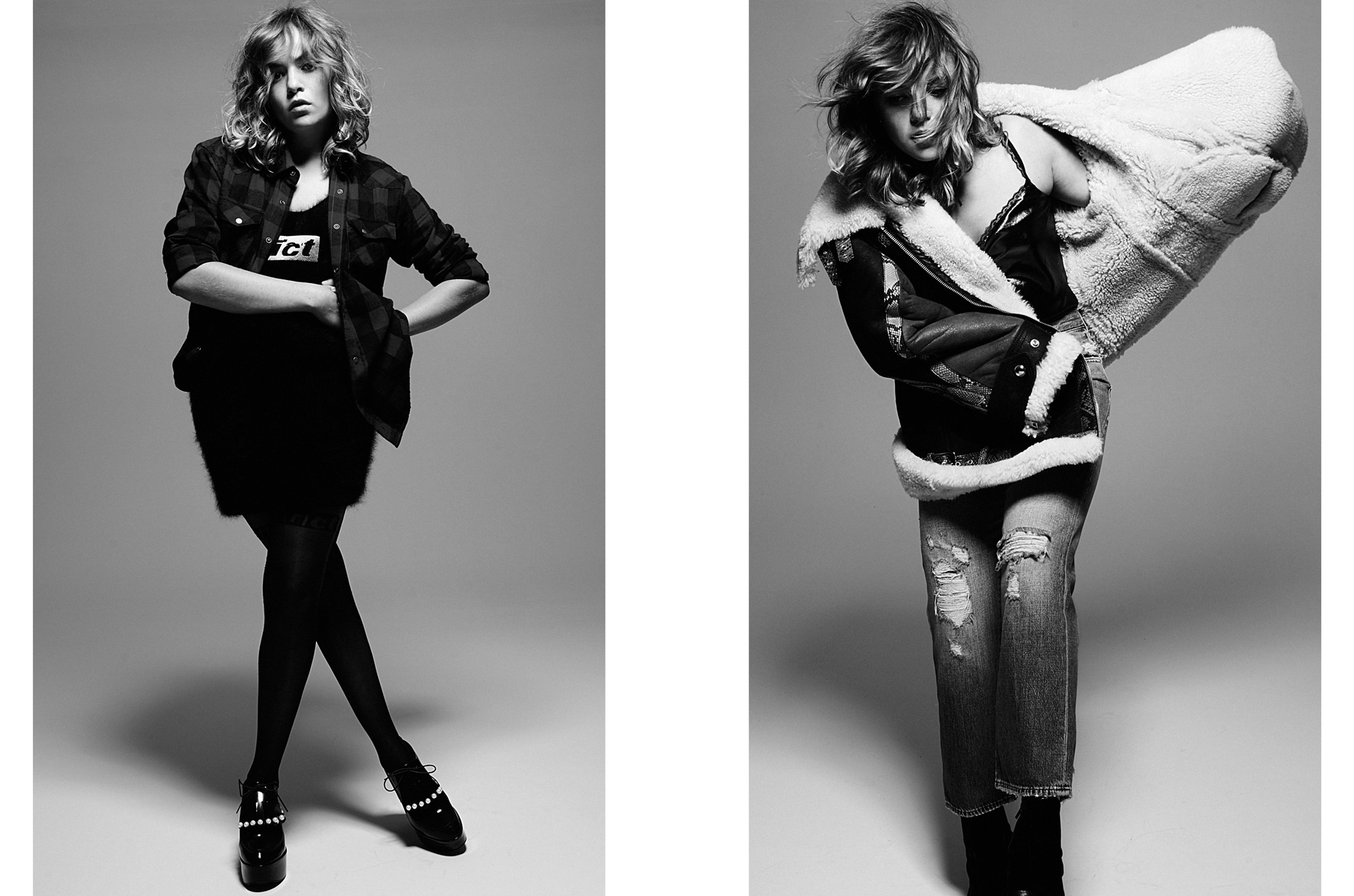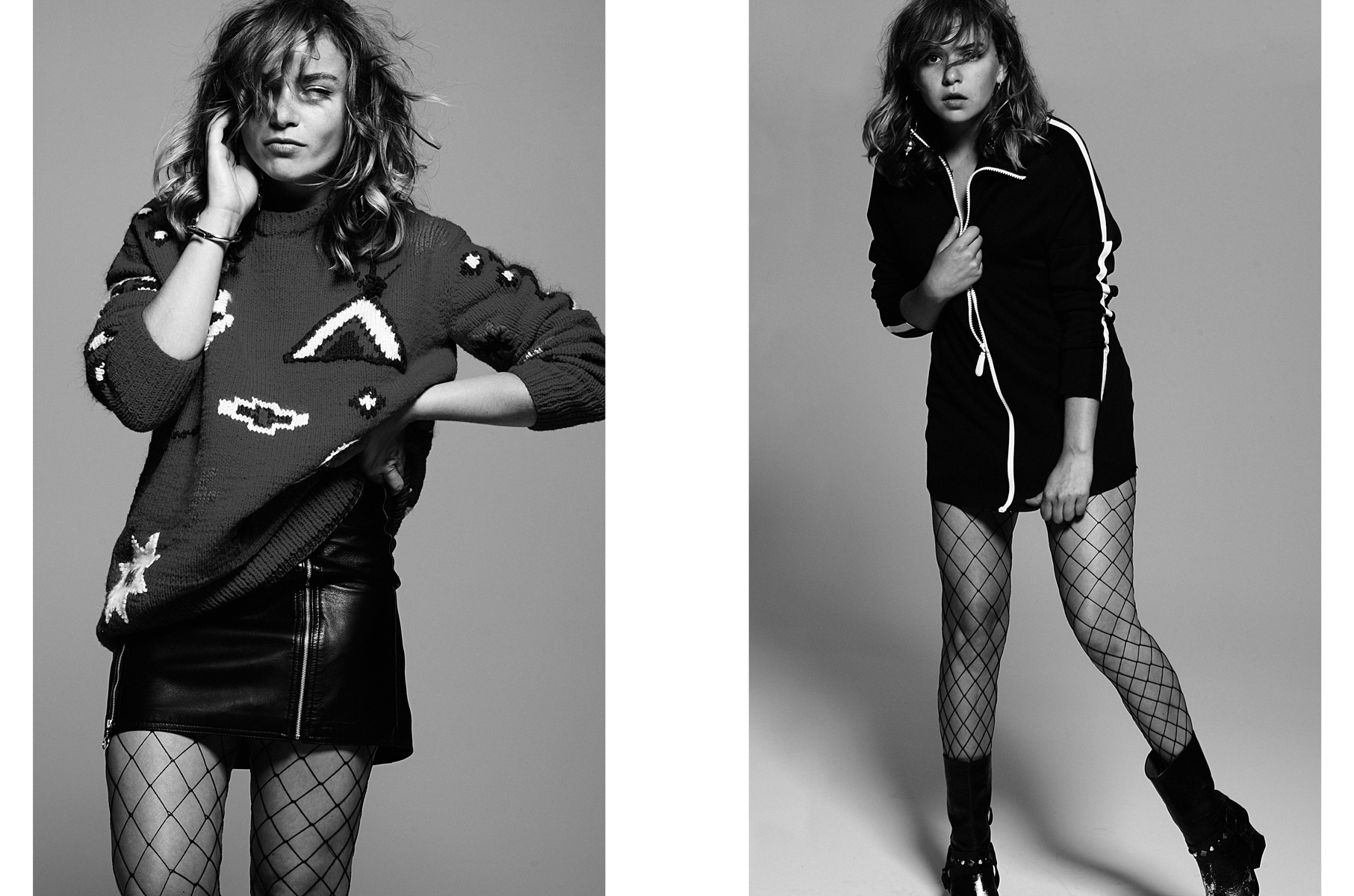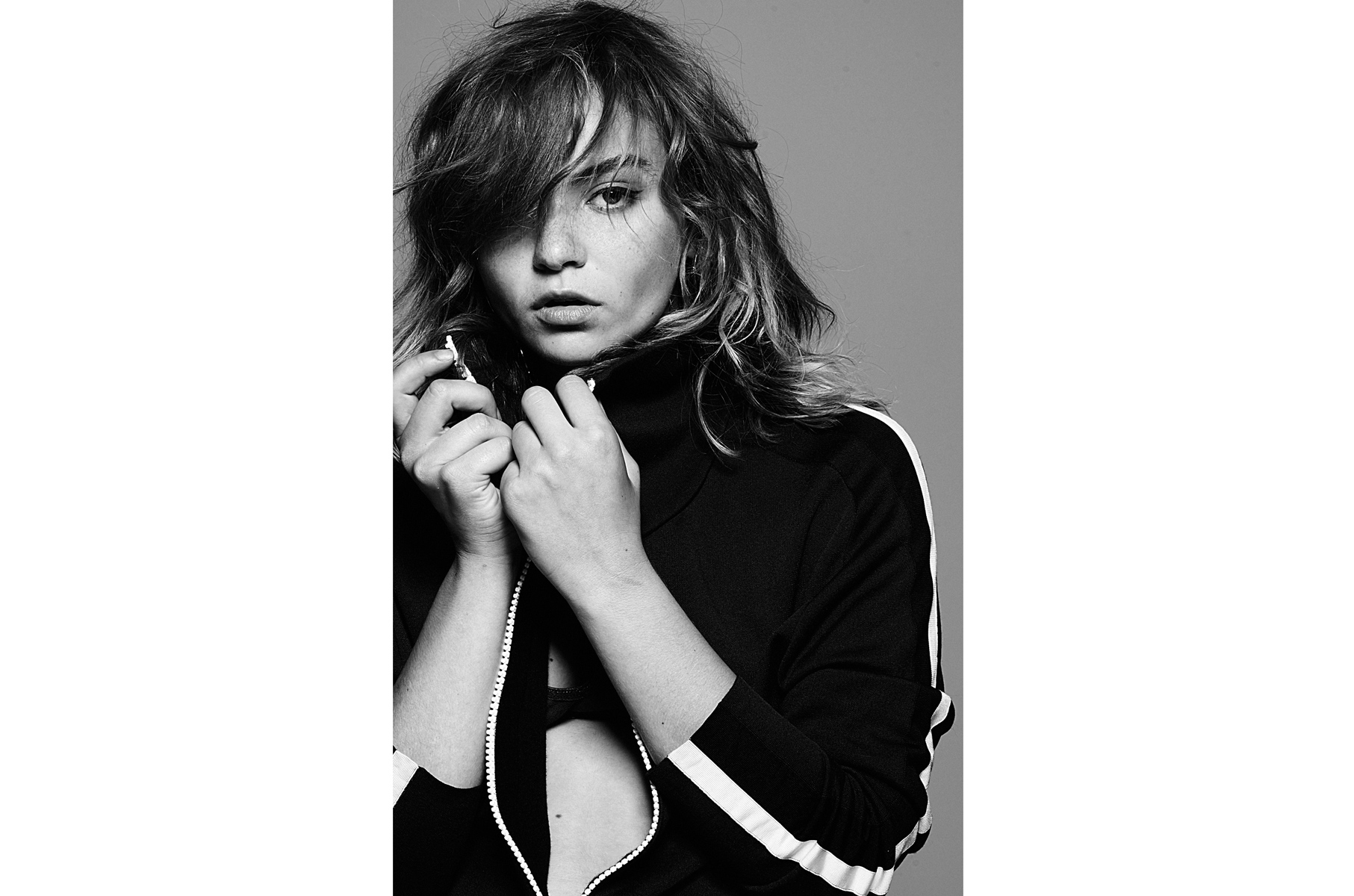Morgan Saylor
Interview by Elizabeth Wood
Images by Jan-Willem Dikkers
Styling by Jesper Gudbergsen
Makeup by Regina Harris
Hair by Claudio Belizario
Special Thanks to Milk Studios, New York
“Sexuality in films is much more taboo than a lot of things...
like gun violence or violence as a whole. I like sexuality in films.
I find it interesting when I see movies that portray it
honestly as part of the story and the relationship between people.”
— Morgan Saylor
Morgan Saylor
Born in Chicago and raised in Georgia, Morgan Saylor is an actor who plays the lead of Leah in White Girl. Her past work includes the recurring role of Dana Brody in Homeland (2011-13), Rob Reiner’s Being Charlie (2015) and McFarland, USA (2015). Saylor will play a nun in the forthcoming Novitiate (2016) and currently attends the University of Chicago.
Elizabeth Wood
New York-based writer and director Elizabeth Wood premiered her debut feature film, White Girl, at Sundance 2016 and was nominated for the Dramatic Grand Jury Prize. White Girl is based on real-life events experienced by Wood when she moved to New York from Oklahoma for college. She has also directed short films and a documentary, Wade in the Water Children (2007), which collects footage taken by underprivileged school children in New Orleans after the devastation of Hurricane Katrina.
White Girl
A 2016 film written and directed by Elizabeth Wood, White Girl stars Morgan Saylor as its central character, Leah, with rapper Brian ‘Sene’ Marc as her love interest Blue and India Menuez as her best friend. Based in Queens, the film follows 19-year-old Leah, a second-year college student and intern at a magazine, who parties recklessly while attempting to get Blue out of jail. The film also stars Justin Bartha, Chris Noth and Adrian Martinez, and was executive produced by Christine Vachon (Carol, Boys Don’t Cry). White Girl premiered at Sundance 2016 and garnered a nomination for the Dramatic Grand Jury Prize.
Writer-director Elizabeth Wood’s debut film White Girl is based in her own story of moving from Oklahoma to New York after high school: young, a bit innocent but brash and eager for new experiences. Played by Morgan Saylor, the film’s central character is bleach-blonde, chainsmoking Leah who moves to Queens with her best friend (artist India Menuez) before her second year of college and interns at a magazine in the city. When her hookup with a neighborhood Puerto Rican boy, Blue (rapper Brian ‘Sene’ Marc), ends with him in jail for selling drugs, she takes it upon herself to free him. The eponymous white girl becomes this double-entendre: Leah coming to terms with her whiteness and its inherent privilege while she parties, sees a lawyer, and does and sells copious amounts of cocaine.
Throughout the film, a hand-held camera focuses almost exclusively on Saylor, watching her reel through euphoric, private and terrible moments with the feeling of cinema verité. Her experience is incessantly anxiety-inducing but unquestionably devastating, especially in the hands of Wood, who deeply understands the character, her sexuality and flaws and doesn’t allow the audience to take advantage of or objectify her the way men in the movie otherwise do.
In life, Wood and Saylor are so close that they talk like siblings, and Saylor is not much like her character in White Girl. She is currently studying math at the University of Chicago, and is equally disciplined in her art—while shooting White Girl’s scenes out of order, she created a graph to track Leah’s shifting states of mind, from confident and naive, to manic and reckless, to low and confused. The two talk about making the film in Wood’s New York home.

Morgan Saylor: So we just tucked Elizabeth’s son into bed. It’s the end of August and the movie’s about to come out. It’s been almost two years since we shot it.
Elizabeth Wood: You’re right. We’ll be dead before we know it.
MS: This feels funny. We’re staring at one another over our phones, and we’ve had a million conversations but here we are recording. Elizabeth, tell me about when you started to write this?
EW: Well, I wrote the first page while the real-life event was happening in 2004.
MS: So it was the summer after your junior year [of college]?
EW: That is when the whole thing wrapped up. It was a year-long process. In the movie it’s a week-long process—you know how these things go… I talked and thought about it a lot, then wrote 15 more pages in 2009. I wrote a 200 page draft in 2010 and wrote a more coherent draft in 2012. In 2013, I edited. In 2014, we shot it. So in showtime, it was three years from crazy longest draft to tight, wet, little draft.
“My goal for your role was finding someone
who didn’t confuse me with what kind
of human they were. You were just such a real
person that I wanted to work with you.”
— Elizabeth Wood
MS: Did you always know that you wanted to make films?
EW: No, I always changed my mind. In high school, I was a theater major. I came to New York to study writing, then kind of switched.
MS: Did you always want to come to New York?
EW: I wanted to sell jewelry on the beach in Australia. Haven’t I told you this?
MS: There’s an ongoing joke that Elizabeth’s told me everything. Whenever we’re out for dinner with friends, she goes to tell me a story and more than half the time, she’s told it to me. I think it’s because we spend a lot of time together, and I’ve picked her brain a bit.
EW: It makes me feel like a grandma. So my parents tried to bait me, like, “If you stay in Oklahoma, you can have your mom’s Volkswagen and open a thrift store.”
MS: You drove your mom’s van in high school.
EW: I had the van and they bartered with the year 2000 silver bug. It had the little vase for the flower in it. They wanted me to go to Oklahoma Christian because I could go for free. I was like, “I’m not going to go to college.” And that’s when they were like, “Do you want to go to New York?” I had never been here. I had already applied to 17 colleges and just wanted to go anywhere—Australia, France, Santa Fe, Oregon and Washington. And then I accidentally confused two letters and threatened one with the other, and both of them told me they didn’t want me anymore.
MS: So you ended up in New York.
EW: How about you: Why didn’t you go to college immediately?
MS: I didn’t want to go to college. My brother didn’t go to college. My parents weren’t big college people. They went to community college in Florida, where they met. I didn’t want to apply to school because I was ready to travel and act. I thought I would move to LA, which would have sucked. But then during my senior year, I worked a little in New York and worked a little in LA and realized I hated LA; that New York is the center of the universe.
EW: It’s nice in LA. It has a heartbeat from the earth, where you hear it singing through the levels of volcanic rock and palm trees and glaring sun like, “Boom-boom, boom-boom, boom-boom.”
MS: You hear the train here. “Choo-choo, choo-choo, choo-choo.” But my friends made me apply [to college] because I am a weird math dork, and I got nice scores on tests. So I did, but I never had any intention of going to school. I moved to New York the summer after high school. This was a little more three years ago now. Lo and behold, here I am a year into school and think it’s the greatest thing in the entire world.
EW: And they let you defer two years?
MS: The second year I wrote a letter that was like, “I have all these neat projects lined up.” And I had White Girl!
EW: Are you going to be a mathematician?
MS: No. People ask me that a lot.
EW: What kind of job do you do with a math degree?
MS: Act!
EW: Why do you go to school for math if you don’t want to do something with math?
MS: Math is the thing that makes my brain shake the best, in the good way. When I meet with an advisor or other math majors, they tell me not to major in it unless I’m going to become a professor, because it’s a deep hole. Maybe your brain shakes too much if you go down that hole.
EW: But you must have some secret fantasy.
MS: When I was in high school and started to get into math, I had a secret fantasy of being a physicist. But I enjoy being creative more. I don’t think I could handle a non-creative job.
EW: The most creative and exciting class I ever took was theoretical physics. Very simple equations, but it was mostly the ideas.
“This felt like a script about young people that
I usually don’t read because most
of the scripts are these goofy, kind of sweet,
high school comedies. White Girl
was something about this age that felt real.”
— Morgan Saylor
MS: I see the ideas in mathematics in acting a lot.
EW: I was trying to explain to people the graphs you did for White Girl. Can you explain that?
MS: With White Girl specifically, I was beginning to figure out how actors could have a method to the madness. You could prep and figure out a way into the storytelling. So one of the big things I did for White Girl was timeline it out. The script is 80-90 pages, and maybe has 100 or 110 scenes. “Act One” is only a few days, then “Act Two” is only two days, but a lot of things happen—there are like 50 scenes in it. We talked a lot about Leah’s different highs, and not just in terms of drugs, not even manic, but her highest highs and lowest lows. “Is she more intense in this scene as opposed to this scene?”
EW: Because when you’re shooting out of order, how do you chart where you were in one scene versus another? Before we shot, I swore to you that we’d shoot it on film and in order—two things that went out the window very quickly. We both did a lot of preparation on telling a story where, more than most films, you have to respond to what just happened for it to make sense. “This happened, therefore she feels sad, feels happy, feels up, down.” If those those performances or feelings weren’t connected, the film would just fall apart.
MS: Because Leah is such the driving force….
EW: She alone is in every scene of the movie. Literally almost every frame of that movie, except for one time we see a curtain. And the one time we see India getting fucked. Besides that, you are in every second of the film.
MS: I think of that mathematically in a bigger sense too—there’s the arc of the entire story and perhaps the derivative of that is the character’s arc. I believe there’s a lot to that, but I sound like a crazy freak. On top of that, I trust my gut more than anything. I drop the math when I’m on set. Because you can’t think about a fucking graph when you’re trying to act.
EW: We both had to connect to the character, all the characters and the through-line, which is really hard to do! We did a lot of work because we had the luxury of time, the drive and the fear of God in us to make sure it made sense, while some people would take it for granted that editing would figure it out.
My goal for your role was finding someone who didn’t confuse me with what kind of human they were. You were just such a real person that I wanted to work with you. I can’t help but being super critical of people who want to act in general—but not you. Even though I’ve tried to act and thought it would be fun, I wonder, “What is that impluse?” Do you feel like you’re unusual as an actress?
MS: Not completely. I know what you mean, of course. I started acting when I was 10, and one thing I’ve figured out in the past few years is the difference between being a celebrity and being an actor. It sounds obvious, but I didn’t realize it when I was younger because most of the time they’re paired together on the cover of a magazine. And I don’t want that at all.
EW: I know a lot of people who I consider very serious actors who are not famous—my New York theater friends.
MS: I think perhaps living in New York has helped me understand that, but when I was a kid what I wanted to be was a famous actor, which in my brain was on the cover of People.
EW: How did you make the decision to do this film when it called for so much sex, nudity, drug use, profanity?
MS: This felt like a script about young people that I usually don’t read because most of the scripts about young people are these goofy, kind of sweet, high school comedies. White Girl was something about this age that felt real. I knew kids who did this.
EW: You knew kids that had sex and did drugs?! What kind of people are you friends with?
MS: Exactly. Anyway, I mean it. No movies talk about this, and these are things that everyone does. As a girl who came to New York, becoming a young woman and figuring out how to be a person, it felt like a very important story to tell.
“If I were your age as an actress, I would have
wanted this role, but I’d be so scared
for the same reasons I’m scared even having
directed it—the guilt and shame I feel.”
— Elizabeth Wood
EW: If I were your age as an actress, I would have wanted this role, but I’d be so scared for the same reasons I’m scared even having directed it—the guilt and shame I feel. Maybe that’s my Christian upbringing, which you didn’t have. What were your biggest fears?
MS: Sexuality in films is much more taboo than a lot of things that, to me, seem weirder or sillier to show on big screens, like gun violence or violence as a whole. I like sexuality in films. I find it interesting when I see movies that portray it honestly as part of the story and the relationship between people, because it’s something that most people do and a part of our lives that is fascinating. Big fears: maybe that the film would be terrible. I had hesitations or qualms, sure, but I talked them through in my brain and with friends and found out why I was also excited. I remember reading the script and being like, “I can’t wait to see this no matter who’s in it.”
EW: That’s a good feeling. It could have only ever been you. I never really thought White Girl wouldn’t work out unless it fell apart. I had faith in my determination and our team to figure something out. It was like, “How is a movie made? Is there something I can’t control?” [At least] I didn’t have to take off my shirt.
MS: But you still did! To feed the baby every once in awhile.
EW: That’s fairly biological. I guess what you were doing was also fairly biological, to be fair. Did we ever discuss if Leah was on birth control?
MS: We did. We wanted to slip in a shot of a pack of it on her bed because we never see her use a condom.
EW: When she was snorting coke, we should have seen her take a birth control pill after it, “Oops!”
MS: That one detail was like, “Is she on birth control? Do we see condoms? We don’t have time to see condoms. Would there be condoms in the moment? No. Would she care?” In the end, she would think about it, but she would go for it anyway. And we also thought about always having the bottom of her feet dirty because she was on the roof barefoot a lot.
EW: I’m sure your feet were dirty.
MS: They were. I made it a chore before scenes in the bedroom to walk around the sidewalk. There were a lot of things that were so specific that aren’t that visible now, like her shoe choices.
EW: Tie-up black platforms.
MS: Those and the red Dorothy shoes.
EW: No one really noticed your Dorothy shoes.
MS: But they felt really important to my character.
EW: Alright, we have to have my ex-boyfriend over now… I got a call during the premiere of my film that my ex-boyfriend, who I haven’t spoken to in 15 years, is in jail. I’m the only number he knows, and he happens to be in New York. I bailed him out, and now he owes me $960. So come back next week to hear how that goes.
MS: Goodnight and good luck.











